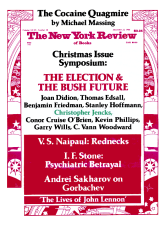In response to:
Black Crime, White Racism from the March 3, 1988 issue
To the Editors:
The review by Andrew Hacker on several books on race in The New York Review of Books [March 3, 1988] recently reminded me of a story which I thought I might share with you. A few years ago, my uncle, a black man then in his early sixties, earned his living driving a taxicab in Chicago. One winter’s evening he was robbed at gunpoint by a couple of young black men who took his money, his cab, and his clothes. My uncle nearly froze to death before he could obtain help. I am sure that my uncle would be delighted to learn Justice Wright’s interpretation of his assailants’ actions as “protests against the social contract.” He had been under the impression that these noble young men were merely trying to steal his hard-earned money and perhaps kill him in the process.
I find equally curious Hacker’s selection of the Toni Morrison comment that “At no moment in my life have I ever felt as if I were an American.” What, pray tell, did she feel that she was? I know from experience that it would take less than twenty-four hours in Lagos or Kinshasa to convince her that she was not African. Hacker indicates his disappointment at not finding more successful black “models” but I wonder if he has looked for any. If not, may I recommend a few?
My grandparents were sharecroppers who moved North between the World Wars. My mother received a high school education in Chicago and retired after many years as a clerk-typist with the federal government. My father received only an eighth grade education and retired from the postal service although he held many other semi-skilled jobs. Serious financial difficulties early in their marriage contributed to their separation and subsequent divorce. My brother and I were reared by our grandmother in a small town in Michigan where blacks represented about 20 percent of the population. Now my brother and I are both college graduates with solidly middleclass careers: he is an Army colonel and I am a diplomat. We each earn over $50,000.
Hacker might think there were peculiar family characteristics which made us somehow exceptions to the general pattern, but this is not the case. One of my high school classmates, who grew up in a house without running water, was elected to serve on the Michigan State Supreme Court. Another classmate is chief of police in the town while my former next door neighbor is chief of detectives for the country police. Another classmate is principal of the high school we attended. We all came from working class or poor family backgrounds.
While none of us is as visible as Bryant Gumbel or Arthur Ashe, we are in our own ways just as successful and our lives are probably just as rewarding. We live comfortable lives and none of us seems likely to serve time in prison as Hacker implies is the ordained destiny of many black people. Even my parents would probably say that their lives have been much better than they expected life would be. They (separately) own their own homes, take vacations to California, and generally have enough money to do what they wish….
Gilbert M. Johnson
Bethesda, Maryland
This Issue
December 22, 1988



